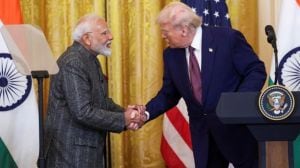Click here to join Express Pune WhatsApp channel and get a curated list of our stories
Family bonds: Sister donates kidney to brother’s wife; father to son
The entire month, there will be medical checkups for relatives of patients to promote kidney health for all, he added.
 On the left is Sukanya Kulkarni (wearing glasses), the Kidney Receiver. On the right is Shyamala Kulkarni, the Donor
On the left is Sukanya Kulkarni (wearing glasses), the Kidney Receiver. On the right is Shyamala Kulkarni, the Donor Often family drama series feature how sisters and their brother’s wives don’t get along or then there are comic ones that playfully take a jibe at such relationships.
Now, here’s a real-life story that shows just how strong these bonds can be as a sister selflessly donated her kidney to her brother’s wife. On January 22, Nashik-based Shyamala Kulkarni (66) donated her kidney to her brother Hemant Kulkarni’s wife Sukanya (58), who was suffering from chronic kidney disease. “Dialysis is not a permanent solution and without any hesitation, I decided to donate my kidney to my sister-in-law,” Shyamala told The Indian Express.
If that emotional bond tugs at one’s heart, then a week before that on January 15, Mumbai-based paediatrician Dr Popat Shravan Sathe (61) donated his kidney to his 29-year-old physiotherapist son Tushar.
For Tushar, it is yet a gift of life again as at that young age, he suffered chronic kidney disease due to an unknown etiology. Admitting that he would snack on outside food due to his long work hours it came as a shock when he was diagnosed with chronic kidney disease.
While dialysis helped both patients – Sukanya Kulkarni and Tushar Sathe, doctors advised a transplant. Tushar’s blood group matched with his father’s who told The Indian Express it was ‘his duty both as a medical doctor and father to donate.’
 On January 22, Nashik-based Shyamala Kulkarni (66) donated her kidney to her brother Hemant Kulkarni’s wife Sukanya (58), who was suffering from chronic kidney disease.
On January 22, Nashik-based Shyamala Kulkarni (66) donated her kidney to her brother Hemant Kulkarni’s wife Sukanya (58), who was suffering from chronic kidney disease.
However, in Sukanya’s case, the blood group did not find a match with her husband, son, and daughter. Sukanya recalled that she would often talk to Shyamala, who voluntarily decided to donate. “We shared the same blood group and my sister-in-law was also inspired by her mother who had decided to donate her eyes and another doctor couple from Nagpur who had donated their kidneys,” Sukanya recalled.
Laparoscopic technique for kidney removal.
What is also unique about these kidney transplants is the use of laparoscopic technique by noted Pune-based laparoscopic surgeon Dr Jyotsna Kulkarni and her team. Performed at UROKUL-Kulkarni Uro Surgery Institute, the doctors used the laparoscopic technique and did not require open surgery.
Dr Sanjay Kulkarni, director of UROKUL-Kulkarni Uro Surgery Institute and past president of the Urology Society of India, said traditionally the donor, a healthy individual, would have to undergo a major operation where the kidney is removed after a large incision. However, using the laparoscopic technique, tiny incisions are made to remove the kidney and the donor goes back to his/her routine activity in a few days.
UROKUL is a 105-bed facility in Pune for urology and nephrology patients.”This is the sought-after referral centre for patients having urethral obstruction and obstructed flow of urine,” said Dr Kulkarni.
The institute is self-sufficient in caring for kidney and dialysis patients and has a 10-bed dialysis unit with the most advanced machine and treatment protocol. “The surgeries for the donor were done with laparoscopic techniques, due to which the blood loss was very minimal, and the patient recovered faster and without much pain,” said Dr Jyotsna Kulkarni adding that both the donors and recipients are doing well.
According to consultant nephrologist and transplant physician Dr Suhas Mondhe, almost weekly he consulted at least four patients in their 30s who had advanced kidney disease and in most cases, it was of unknown etiology. “For instance, Tushar had seriously high creatinine levels that indicate kidney impairment. However, there was no specific cause. Hence, ahead of World Kidney Day (March 14), we want to step up awareness about the importance of kidneys to our overall health,” said Dr Mondhe.
The entire month, there will be medical checkups for relatives of patients to promote kidney health for all, he added.
Click here to join Express Pune WhatsApp channel and get a curated list of our stories













